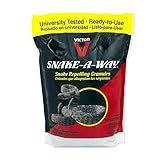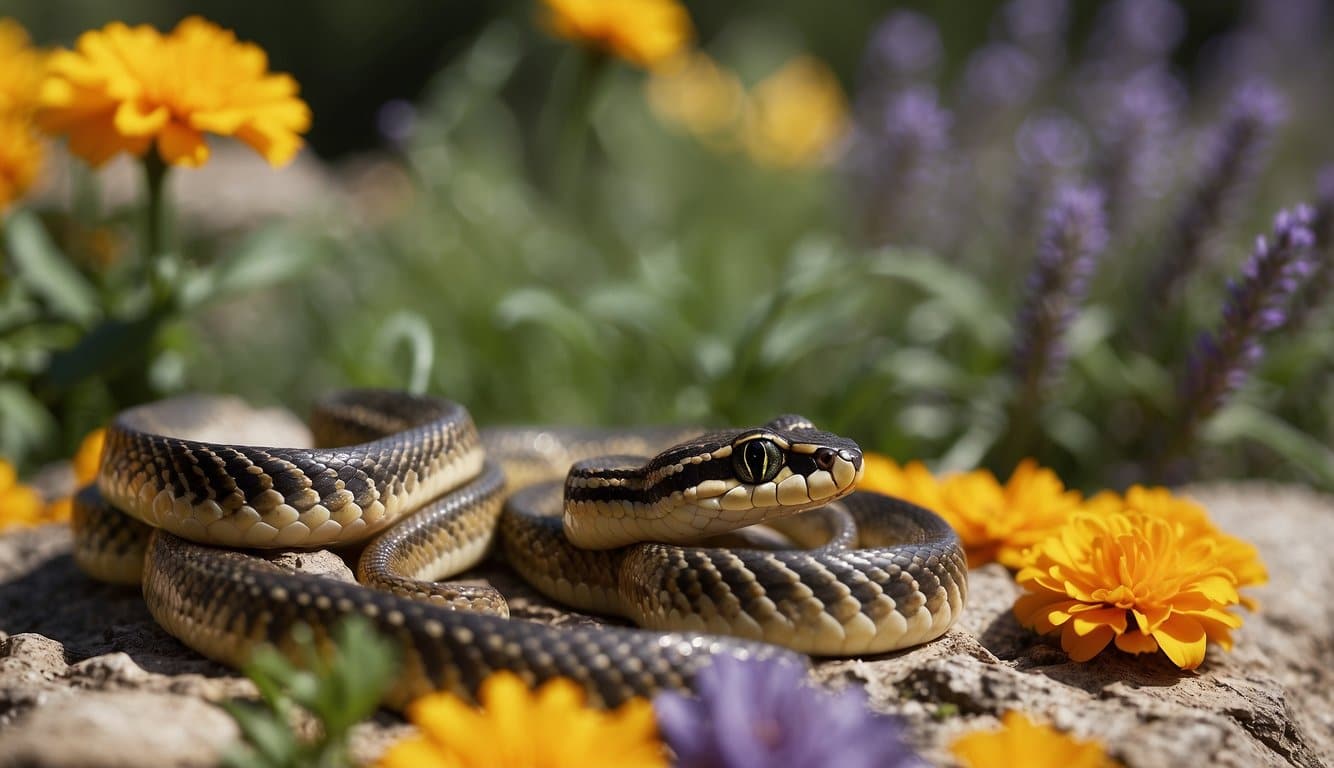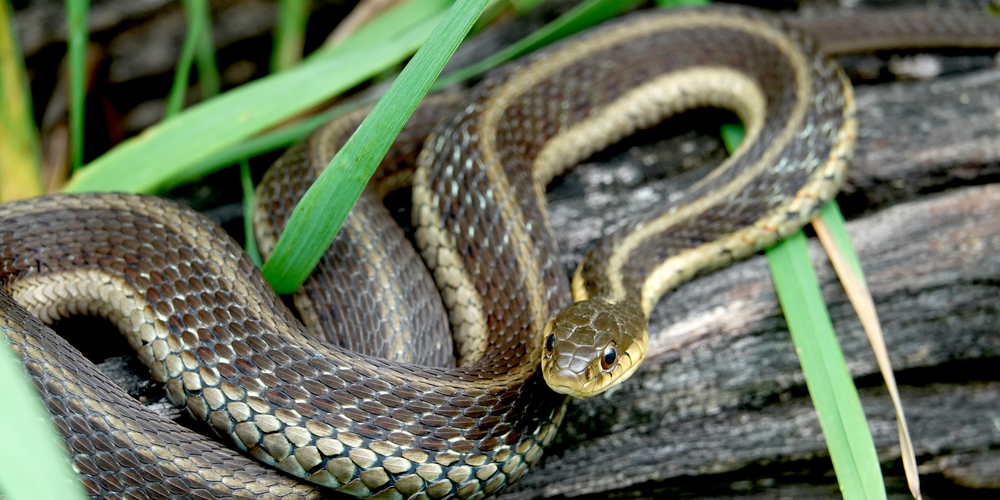Garter Snakes Do Have Value (We’ll Still Cover Getting Them Out)
Garter snakes are a common sight in many parts of North America. To effectively manage their presence on your property, it’s essential to know their habits and what drives them to your yard.
- Habitat: Garter snakes favor areas with abundant cover and nearby water sources.
- They thrive in gardens, meadows, woodlands, and even suburban areas.
- Diet: They mainly feed on amphibians, earthworms, small fish, and rodents, contributing to the control of pests in your garden.
- Reproduction: Females give birth to live young in late summer or early fall, which can rapidly increase the population in your area.
Behavioral Traits:
- Garter snakes, being cold-blooded, rely on external heat sources to regulate their body temperature.
- They are generally harmless and shy away from confrontation, but will defend themselves if provoked.
- In colder climates, they hibernate in communal dens, which can sometimes be located near human-inhabited areas.
Identification:
- Size: Typically 23 to 30 inches long
- Markings: Noticeable stripes running the length of their body
- Colors: Usually a combination of green, yellow, and brown tones
Benefits to the Ecosystem:
- Maintain a balance by preying upon insects, slugs, and other small animals.
- Act as prey for larger predators, supporting the food chain.
Safety Considerations: While not venomous, their bites may cause mild irritation. It’s important to wear gloves if you need to handle them and to wash the area thoroughly afterward.
Using Natural Repellents
When seeking to deter garter snakes from your property without causing harm, consider natural repellents that alter their behavior. These methods can be environmentally friendly and effective.
Plant-Based Deterrents
Certain plants act as natural snake repellents due to their strong scents or physical structures. Here are a few to consider incorporating into your landscape:
- Lemongrass: Emits a citrus smell that snakes find unpleasant.
- Marigolds: Produces a scent that is known to deter snakes and other pests.
To maximize effectiveness, plant these around the perimeter of your yard or in areas where snakes are frequently seen.
Predator Urine
The scent of a predator can be a powerful deterrent for garter snakes. You can use urine from the following animals to keep snakes away:
- Fox urine: Mimics the presence of a natural predator.
- Bobcat urine: Another effective option that can instill fear and drive snakes from your property.
Place the urine strategically around your property’s perimeter or in garden areas to create a barrier that garter snakes will likely avoid.
Keeping Them Away Through Environmental Management
Managing your environment can greatly reduce the presence of garter snakes. Through specific landscape adjustments and water source control, you can make your garden less inviting for these creatures.
Habitat Modification
- Keep the Grass Short: Regular mowing deprives garter snakes of hiding places, making your yard less appealing.
- Prune Plants: Well-maintained shrubbery reduces cover for snakes and their prey.
- De-clutter: Remove debris, including rocks, wood piles, and leaves where snakes might shelter.
Water Source Management
- Repair Leaks: Fix any leaking faucets or sprinklers to avoid water accumulation.
- Proper Drainage: Ensure your yard has suitable drainage to prevent standing water, which can attract snakes.
Physical Removal Methods
When dealing with garter snakes on your property, one of the effective, straightforward strategies is physical removal. Here are concrete steps you can take:
- Inspection: Carefully inspect your yard for garter snakes or their hiding spots. Look beneath rocks, logs, and dense vegetation where they might take refuge.
- Manual Capture:
- Use gloves to protect your hands.
- Gently grab the snake behind the head to prevent it from biting.
- Place it in a cloth bag or a bucket with a secure lid.
- Relocation:
- Transport the snake to a new location away from residential areas.
- Release it into a suitable natural habitat, ensuring it’s at least one mile from your home.
- Use of Tools:
- Snake Tongs: For a safer way to capture snakes without directly handling them.
- Snake Hooks: Useful to maneuver snakes into a container.
- Professional Help:
- Consider hiring a wildlife removal expert if you’re uncomfortable handling the situation yourself.
Note: Always check your local wildlife regulations before attempting to remove or relocate any snakes, as some may be protected species.
- Traps:
- Set up humane traps along the edges of your yard or near known snake paths.
- Snake Fencing: Erect a fence designed to keep snakes out, angling it outward to prevent snakes from climbing over. Ensure it’s buried a few inches into the ground.
Preventative Measures
Taking action to deter garter snakes from making a home in your yard hinges on two main strategies: effective fencing and exclusion techniques. By implementing these measures, you create barriers that discourage garter snakes from entering and residing on your property.
Fencing
- Mesh Fencing: Erect mesh fencing that buries at least a foot deep to prevent garter snakes from burrowing underneath. The mesh should have a fine weave, small enough to block snakes but still allow water to pass through.
- Solid Fencing: A solid fence with no gaps beneath can also deter garter snakes. Ensure it’s flush with the ground and extends a few inches underground.
Exclusion Techniques
- Seal Entrances: Inspect your home for cracks or openings where snakes could enter. Seal these areas with caulking or for larger gaps, use wire mesh and expanding foam.
- Habitat Modification: Maintain a tidy yard. This includes:
- Cutting tall grass regularly
- Eliminating debris or rock piles
For specific products and methods to keep garter snakes at bay, ensure to research and follow through with measures that comply with local wildlife regulations.
Frequently Asked Questions
The following FAQs cover practical methods to deter garter snakes and how to alter your environment to make it less appealing to them.
What methods can deter garter snakes from entering a home garden?
- A variety of methods can deter garter snakes, such as keeping your lawn trimmed and using natural snake repellents like sulfur, clove oil, or cinnamon.
Are there any effective home remedies to repel garter snakes?
- Certain strong-smelling substances act as natural repellents. Home remedies that can repel garter snakes include sprinkling clove oil, cinnamon, or ammonia around your property.
What landscaping or garden practices can attract garter snakes?
- Tall grasses and dense plantings offer hiding spots for snakes. Debris and wood piles also attract garter snakes as they can provide shelter and food sources.
Is it recommended to actively remove garter snakes from residential areas?
- While garter snakes can be beneficial by controlling pests, if you have a large population or a personal concern, removing them may be considered using gentle traps and relocation.
How can I create a natural barrier to prevent garter snakes in my yard?
- Constructing a fence lined with hardware cloth or aluminum flashing can serve as an effective snake-proof barrier. Bury the lower part of the fencing into the ground to prevent snakes from burrowing underneath.
What are the environmental factors that could be inviting garter snakes into my property?
- Your yard might provide convenient access to food, water, and shelter, all of which are environmental factors that can invite garter snakes.
- Managing these resources can make your property less attractive to them.
Last update on 2025-06-06 / Affiliate links / Images from Amazon Product Advertising API




